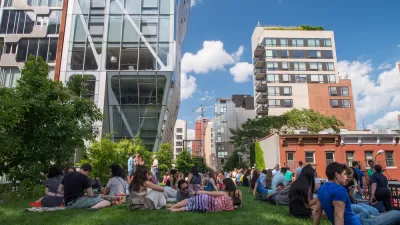After a decade of debate, Richard Florida's theories on the 'creative class' have been championed by many, and challenged by others (perhaps none more forcefully than author Joel Kotkin). In recent articles, the two are battling it out once again.
"Among the most pervasive, and arguably pernicious, notions of the past decade has been that the 'creative class' of the skilled, educated and hip would remake and revive American cities," begins Kotkin's article in The Daily Beast. "The idea, packaged and peddled by consultant Richard Florida, had been that unlike spending public money to court Wall Street fat cats, corporate executives or other traditional elites, paying to appeal to the creative would truly trickle down, generating a widespread urban revival."
Kotkin points to a recent article by Florida in The Atlantic Cities as an admission by the author that this trickle down theory is flawed. "One group certain to be flustered by this new perspective," Kotkin continues, "will be many of the cities who have signed up and spent hard cash over the years to follow Florida’s prescription of focusing on those things—encouraging the arts and entertainment, building bike paths, welcoming minorities and gays—that would attract young college-educated workers."
While Kotkin veers of course from his initial indictment, he concludes that "contrary to the narrative espoused by Florida and other proponents of high-density cities, the predominant future urban form in America is emerging (largely unrecognized to the media) elsewhere, in places less dense, economically diverse and, perhaps, just a bit less hip and cool."
In a response published today, Florida takes on Kotkin's challenge. "First of all," he argues, "it is well known that skills, knowledge, and creativity power economic growth; there is a wide consensus on that."
"Second," he continues, "everyone who actually studies the subject—save Kotkin—agrees that cities and density spur economic growth."
But returning to Kotkin's central point, and Florida's own admissions (going back a decade), he concedes that rising inequality is "a key issue facing our cities and nation as a whole." While "a high share of skills, creativity, and knowledge do lift the wages of every class or group of workers," these are not enough to keep pace with the higher housing costs found in more affluent cities.
"So where does that leave us?" asks Florida. "If we know that the skills, knowledge, and creativity that power economic growth does not lift all boats, what do we do? Stop investing in skills? Stop the flow of people and jobs back to the urban core—which has not only made many cities safer and better places, but helped increase productivity and innovation for the nation as a whole? Encourage people to tear up more of the environment as they build ever-more-sprawling suburbs?"
"Of course not," he concludes. "We need to leverage density, skill, and knowledge to propel further innovation, economic growth and development (lord knows our economy needs it), and at the same time we have to build new institutions, new strategies, and a new urban social compact to improve the lot of those at the bottom."
FULL STORY: Richard Florida Concedes the Limits of the Creative Class

Planetizen Federal Action Tracker
A weekly monitor of how Trump’s orders and actions are impacting planners and planning in America.

Trump Administration Could Effectively End Housing Voucher Program
Federal officials are eyeing major cuts to the Section 8 program that helps millions of low-income households pay rent.

The 120 Year Old Tiny Home Villages That Sheltered San Francisco’s Earthquake Refugees
More than a century ago, San Francisco mobilized to house thousands of residents displaced by the 1906 earthquake. Could their strategy offer a model for the present?

Philadelphia Councilmember Proposes Transit Access Fund
The plan would allocate 0.5 percent of the general fund toward mobility subsidies for low-income households.

Texas Bill Would Ban Road Diets, Congestion Pricing
A Texas state senator wants to prevent any discussion of congestion pricing and could suspend existing bike lane and sidewalk projects.

USDOT Threatens to Pull New York Highway Funding
The Trump administration wants the state to kill New York City’s congestion pricing program despite its demonstrated success.
Urban Design for Planners 1: Software Tools
This six-course series explores essential urban design concepts using open source software and equips planners with the tools they need to participate fully in the urban design process.
Planning for Universal Design
Learn the tools for implementing Universal Design in planning regulations.
Ada County Highway District
Clanton & Associates, Inc.
Jessamine County Fiscal Court
Institute for Housing and Urban Development Studies (IHS)
City of Grandview
Harvard GSD Executive Education
Toledo-Lucas County Plan Commissions
Salt Lake City
NYU Wagner Graduate School of Public Service





























